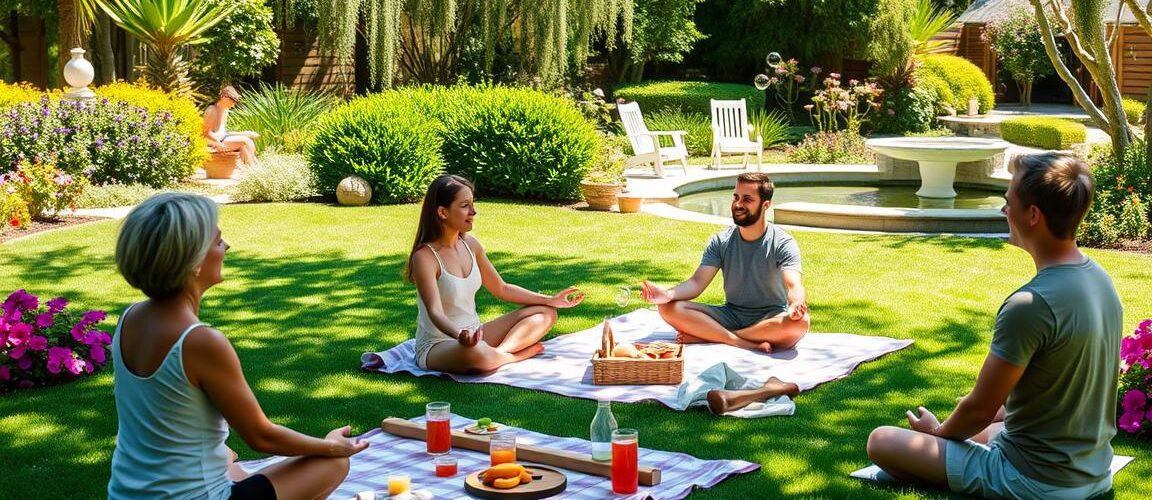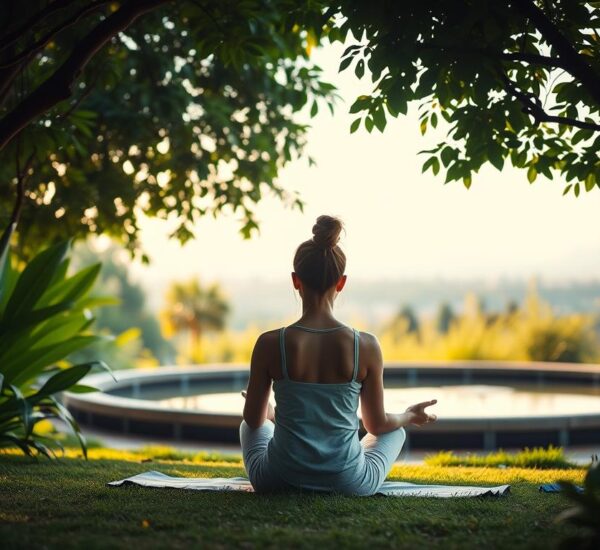As summer arrives, we often feel the need to have a “perfect” season. But do we really enjoy our summer, or are we just trying to meet the ideal image of it?
Mental Health First Aid USA says summer can be tough for our mental wellbeing. The change in routines and the pressure to enjoy every moment can be overwhelming. It’s key to focus on our mental health and make choices that support our mental wellness during this time.
Let’s take care of our mental health as we enjoy the season. Just like we manage our work-life routine, we can actively support our mental health. This way, we can fully enjoy our summer while keeping our mental wellbeing strong.
Key Takeaways
- Prioritize mental wellbeing during summer
- Maintain routines to reduce stress
- Make conscious choices for mental wellness
- Take proactive steps towards mental health
- Make the most of summer while keeping mental health intact
Understanding the Importance of Mental Health in Summer
Summer is here, and taking care of our mental health is key. It’s a time for fun and rest, but summer also has its own mental health challenges.
The American Physiological Society says we feel more stressed in summer than in winter. This stress comes from the heat and changes in our daily routines.
Seasonal Affective Disorder and Summer
Seasonal Affective Disorder (SAD) is often linked to winter. But, it can also happen in summer. The symptoms can be just as bad, affecting our mood and energy.
It’s important to know SAD can happen in summer too. This means we need summer mental health tips to help manage it and keep our mental health strong.
The Impact of Heat on Mental Health
The summer heat and humidity can make anxiety and depression worse. High temperatures can make us feel irritable and tired. It’s vital to take steps to protect our mental health.
By understanding how heat affects our mental health, we can take action. We can stay hydrated, cool, and do things that help us relax and reduce stress.
Fun Summer Activities to Boost Mental Wellbeing
Summer is here, and it’s a great time to find fun activities that help our mental health. There are many ways to enjoy the season and improve our mental wellbeing.
Being outside is a fantastic way to feel better in the summer. It can help reduce stress and anxiety.
Outdoor Adventures and Nature Walks
Outdoor adventures and nature walks are great for our mental health. They let us connect with nature and feel calm. Some fun activities include:
- Hiking
- Swimming
- Cycling
- Picnicking
Joining local nature walks
These activities are not just fun. They also help us exercise and appreciate nature. As we enjoy these activities, we can feel more grateful for the world around us.
For more tips on personal growth, check out this resource.
Joining Community Events and Programs
Getting involved in community events is another way to boost our mental wellbeing. Here are some ideas:
- Attending outdoor concerts or festivals
- Participating in community sports leagues
- Joining a summer book club
- Taking part in local volunteer work
By joining in, we can meet new people and feel more connected. This is good for our mental health because social connections are important.
Mindfulness Practices for the Summer Months
Summer brings longer days and warmer weather, perfect for mindfulness. It’s a great time to start daily mindfulness routines. These practices help keep our minds healthy and bring peace and strength.

Meditation Techniques for Hot Weather
Meditation is great in summer. Find a cool, shaded spot or meditate early when it’s cooler. Deep breathing exercises help manage heat while meditating. For more tips, check out our article on stress-less living.
Gratitude Journaling in Nature
Gratitude journaling is perfect for summer. Nature, like beaches or parks, is great for reflecting on what we’re thankful for. It helps us see the good in life and feel better.
By adding meditation and gratitude journaling to summer, we boost our mental health. These activities reduce stress and bring calm, making summer easier to handle.
The Role of Nutrition in Mental Health During Summer
As summer arrives, it’s key to see how nutrition affects our mental health. Eating well is vital for our wellbeing. Summer brings fresh, nutritious foods that boost our mood and mental clarity.
Nutrition is key for our brain and emotional health. In summer, eating hydrating foods is extra helpful.
Hydrating Foods to Energize Your Mind
Eating hydrating foods can really help our mental energy. Watermelon and cucumbers are refreshing and full of water. They keep us hydrated. Other foods like strawberries, zucchini, and leafy greens are also good for us.
- Watermelon: Rich in vitamin C and lycopene, an antioxidant that helps protect the skin and brain.
- Cucumbers: High in water content and contain anti-inflammatory properties.
- Strawberries: Packed with vitamin C and antioxidants.
BBQ and Picnics: Healthy Summer Meal Ideas
Summer is great for BBQs and picnics. These are perfect for socializing and eating healthy. Grilling veggies like bell peppers, zucchini, and portobello mushrooms makes for tasty, nutritious meals. Salads with fresh summer produce are also refreshing.
Here are some healthy meal ideas for summer:
- Grilled vegetable skewers with quinoa salad.
- Watermelon and feta salad with mint.
- Grilled chicken or fish with roasted summer vegetables.
By choosing nutritious foods and healthy eating in summer, we support our mental health and wellbeing.
Building a Supportive Social Network in Summer
Creating a supportive social network is key for good mental health in summer. With warmer weather, we can easily meet others. This could be through outdoor fun, community events, or just hanging out with family and friends.
Having strong social ties is very good for our mental health. Social support makes us feel grounded and supported. Summer is a great time to work on these relationships.
Connecting with Friends and Family
It’s important to stay connected with loved ones for our mental health. Summer is full of chances to get together, like BBQs or beach trips. These activities help us bond.
Here are some ways to connect with friends and family:
- Hosting a summer dinner party or BBQ
- Organizing a group outing to a local event or festival
- Planning a family vacation or weekend getaway
These activities create memories and offer emotional support. Both are key for our mental wellbeing.
Engaging in Group Activities
Joining group activities is another great way to build a supportive network. You could join a sports team, a hobby group, or volunteer for something you believe in.
| Activity Type | Benefits | Examples |
|---|---|---|
| Sports and Fitness | Improves physical health, teamwork, and camaraderie | Joining a recreational soccer league, going on a group hike |
| Hobby Groups | Fosters creativity, provides a sense of community | Photography club, book club, art class |
| Volunteering | Enhances sense of purpose, builds connections with like-minded individuals | Beach cleanups, community garden projects, charity events |
By doing these activities, we grow our social network. We also improve our mental health and wellbeing.
Balancing Fun and Rest: Avoiding Burnout
It’s important to find a balance between enjoying summer and resting. Summer brings excitement with outdoor activities and social events. But too much can lead to burnout, harming our mental health.
Burnout is a big concern in summer. We might feel tired, irritable, and unmotivated. Spotting these signs early helps us prevent burnout.
Recognizing Signs of Burnout
Burnout shows up in different ways. Knowing the signs is key. Some common signs include:
- Feeling exhausted or fatigued
- Being irritable or short-tempered
- Lack of motivation or interest in activities
- Difficulty concentrating or making decisions
Being aware of these signs helps us take steps to avoid burnout and keep our mental health strong.
Scheduling Downtime for Mental Clarity
It’s vital to plan downtime to stay mentally clear and avoid burnout. Downtime lets us rest and recharge, keeping us focused and motivated. Here are some ways to add downtime to your summer:
| Activity | Benefits | Duration |
|---|---|---|
| Reading a book | Relaxation, mental escape | 1-2 hours |
| Taking a nap | Recharge, refresh | 20-30 minutes |
| Meditation or mindfulness | Reduce stress, improve focus | 10-20 minutes |
Adding these activities to our daily routine helps us stay mentally clear and avoid burnout.
Enjoying summer means taking care of our mental health. We should balance fun with rest. By recognizing burnout signs and planning downtime, we can keep our mental wellbeing in check.
Understanding the Impact of Summer on Mental Health
Summer brings a unique set of challenges that can affect our mental health. The long days and warm weather can be both a blessing and a curse. While they offer opportunities for outdoor activities and relaxation, they also introduce stressors that can impact our well-being.
One of the key factors to consider is the seasonal affective disorder (SAD). This condition is often associated with the winter months, but it can also occur in the summer. The heat and humidity can lead to feelings of lethargy, fatigue, and a general sense of malaise.
Another important consideration is the summer blues. This is a milder form of SAD that can cause feelings of sadness, irritability, and a lack of energy. It’s common for people to experience these symptoms during the summer months, as the change in routine and the heat can take a toll on our mental health.
It’s also important to recognize the summer anxiety that can arise. The increased exposure to sunlight and the pressure to enjoy the summer can create feelings of anxiety and stress. This can be exacerbated by the expectations placed on us to have a perfect summer, whether it’s through social media or societal norms.
Fortunately, there are ways to mitigate the impact of summer on our mental health. By prioritizing self-care and seeking support, we can navigate the challenges of the season and maintain our well-being.
Strategies for Coping with Summer Stress
Here are some strategies that can help you cope with the stress and anxiety that can come with summer:
- Stay hydrated: Drink plenty of water to combat the effects of heat and humidity.
- Practice relaxation techniques: Engage in activities that help you relax, such as meditation, deep breathing, or yoga.
- Establish a routine: Create a structured schedule to provide a sense of stability and control.
- Seek support: Reach out to friends, family, or mental health professionals for guidance and support.
- Engage in activities you enjoy: Make time for hobbies, interests, and activities that bring you joy and fulfillment.
By implementing these strategies, you can better manage the impact of summer on your mental health and enhance your overall well-being.
Creative Outlets to Enhance Mental Wellbeing
Exploring creativity through summer activities can greatly improve our mental health. Trying new hobbies lets us express ourselves and relax.
Summer is a great time for creative pursuits that boost our mood and wellbeing. Two standout activities are summer arts and crafts, and photography as a hobby.
Summer Arts and Crafts Projects
Summer arts and crafts are a fantastic way to be creative. Activities like painting, drawing, and crafting are calming and help us focus on the moment. They let us tap into our creativity and enjoy making something new.
Photography as a Therapeutic Hobby
Photography is a creative outlet that’s great for the summer. Capturing nature’s beauty through a camera helps us see the world differently. It brings calm and helps us be more mindful.
Both summer arts and crafts, and photography, offer great ways to express ourselves and relax. They’re excellent for improving our mental health during the summer.
Creating a Relaxing Summer Routine
We can boost our mental health by making a relaxing summer routine. A good routine helps us feel grounded and focused. It’s key to enjoy summer’s freedom while taking care of our mental wellbeing.
When setting up our summer routine, we should think about our daily habits. Some like a morning routine to start the day right. Others find an evening routine helps them unwind.
Morning Routines for a Positive Day
Starting the day with a routine can greatly improve our mental health. Good morning activities include:
- Meditation or mindfulness to clear our minds
- Gentle exercise, like yoga or a short walk, to energize
- Journaling or writing down things we’re grateful for to stay positive
Adding these to our morning routine can set a positive tone for the day. It helps improve our mental wellbeing.

Evening Wind-Down Activities
As the day ends, we can benefit from activities that relax us. Some good evening routines include:
- Reading a book or listening to calming music
- Taking a warm bath or doing gentle stretches
- Writing in a journal or thinking about our day
Here’s a simple table showing some morning and evening routines:
| Routine | Morning Activities | Evening Activities |
|---|---|---|
| Relaxation | Meditation or mindfulness | Reading or listening to music |
| Physical Activity | Gentle exercise or yoga | Gentle stretches or a warm bath |
| Reflection | Journaling or writing gratitudes | Journaling or reflecting on the day |
By adding these routines to our daily life, we can keep our mental health up during summer. We’ll enjoy the benefits of a relaxing summer routine.
Seeking Professional Help When Needed
As we focus on our mental health in summer, it’s key to know when to seek help. Getting professional help is a big step in keeping our minds healthy. Mental health care is important all year, not just in summer.
Spotting signs of mental health problems, like anxiety or depression, is the first step. If we feel sad, anxious, or alone a lot, it’s time to get help. Mental health experts can offer the support we need.
Recognizing the Need for Mental Health Support
Starting our journey to healing begins with recognizing our need for support. Therapy or support groups can help us tackle our mental health issues.
We can find resources like these through local mental health groups or online. By getting help when we need it, we can improve our well-being. This way, we can live a happy and healthy life.



